一般将来时 will 的用法
- 格式:ppt
- 大小:2.77 MB
- 文档页数:21
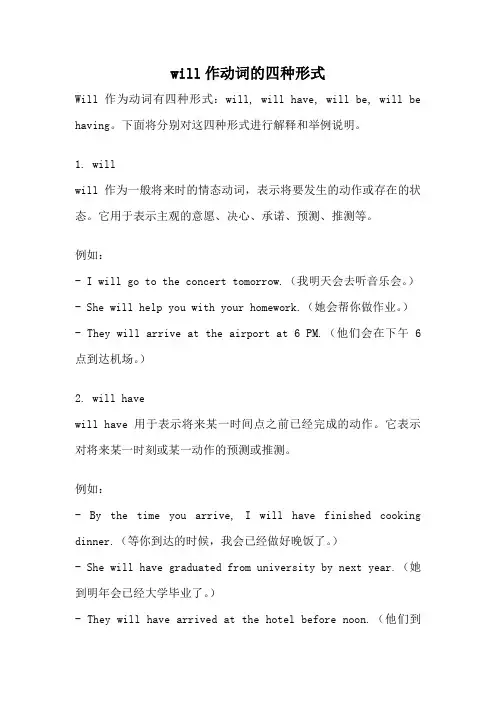
will作动词的四种形式Will作为动词有四种形式:will, will have, will be, will be having。
下面将分别对这四种形式进行解释和举例说明。
1. willwill作为一般将来时的情态动词,表示将要发生的动作或存在的状态。
它用于表示主观的意愿、决心、承诺、预测、推测等。
例如:- I will go to the concert tomorrow.(我明天会去听音乐会。
)- She will help you with your homework.(她会帮你做作业。
)- They will arrive at the airport at 6 PM.(他们会在下午6点到达机场。
)2. will havewill have用于表示将来某一时间点之前已经完成的动作。
它表示对将来某一时刻或某一动作的预测或推测。
例如:- By the time you arrive, I will have finished cooking dinner.(等你到达的时候,我会已经做好晚饭了。
)- She will have graduated from university by next year.(她到明年会已经大学毕业了。
)- They will have arrived at the hotel before noon.(他们到中午之前会已经到达酒店。
)3. will bewill be用于表示将来某一时刻正在进行的动作或存在的状态。
它表示对将来某一时刻的预测或推测。
例如:- I will be studying for the exam this time tomorrow.(明天这个时候我会正在备考。
)- She will be working at the office all day tomorrow.(明天一整天她会在办公室工作。
)- They will be traveling around Europe next month.(下个月他们会在欧洲旅行。
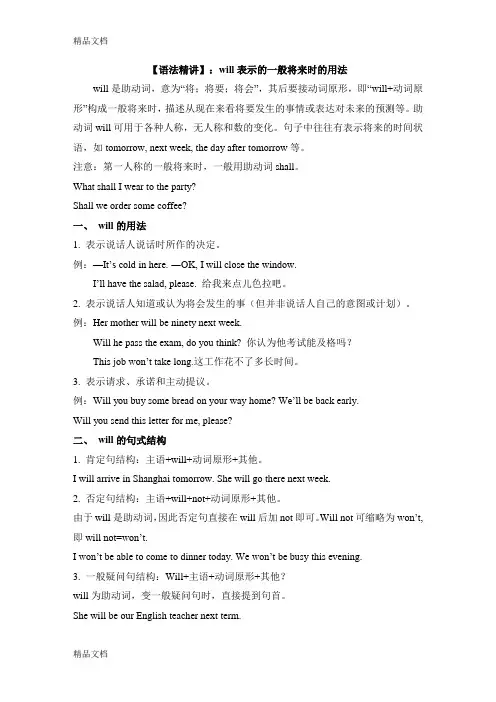
【语法精讲】:will表示的一般将来时的用法will是助动词,意为“将;将要;将会”,其后要接动词原形,即“will+动词原形”构成一般将来时,描述从现在来看将要发生的事情或表达对未来的预测等。
助动词will可用于各种人称,无人称和数的变化。
句子中往往有表示将来的时间状语,如tomorrow, next week, the day after tomorrow等。
注意:第一人称的一般将来时,一般用助动词shall。
What shall I wear to the party?Shall we order some coffee?一、will的用法1. 表示说话人说话时所作的决定。
例:—It’s cold in here. ―OK, I will close the window.I’ll have the salad, please. 给我来点儿色拉吧。
2. 表示说话人知道或认为将会发生的事(但并非说话人自己的意图或计划)。
例:Her mother will be ninety next week.Will he pass the exam, do you think? 你认为他考试能及格吗?This job won’t take long.这工作花不了多长时间。
3. 表示请求、承诺和主动提议。
例:Will you buy some bread on your way home? We’ll be back early.Will you send this letter for me, please?二、will的句式结构1. 肯定句结构:主语+will+动词原形+其他。
I will arrive in Shanghai tomorrow. She will go there next week.2. 否定句结构:主语+will+not+动词原形+其他。
由于will是助动词,因此否定句直接在will后加not即可。
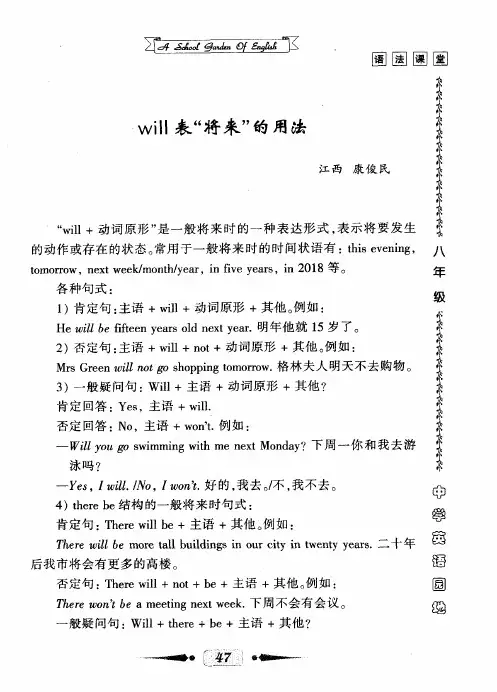
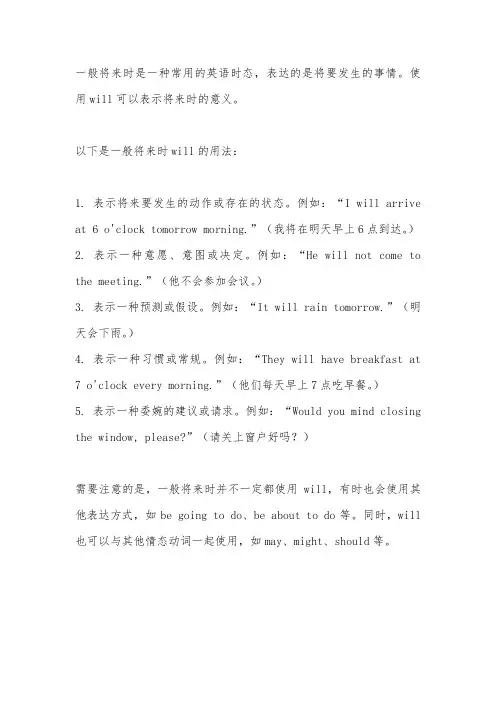
一般将来时是一种常用的英语时态,表达的是将要发生的事情。
使用will可以表示将来时的意义。
以下是一般将来时will的用法:
1. 表示将来要发生的动作或存在的状态。
例如:“I will arrive at 6 o'clock tomorrow morning.”(我将在明天早上6点到达。
)
2. 表示一种意愿、意图或决定。
例如:“He will not come to the meeting.”(他不会参加会议。
)
3. 表示一种预测或假设。
例如:“It will rain tomorrow.”(明天会下雨。
)
4. 表示一种习惯或常规。
例如:“They will have breakfast at 7 o'clock every morning.”(他们每天早上7点吃早餐。
)
5. 表示一种委婉的建议或请求。
例如:“Would you mind closing the window, please?”(请关上窗户好吗?)
需要注意的是,一般将来时并不一定都使用will,有时也会使用其他表达方式,如be going to do、be about to do等。
同时,will 也可以与其他情态动词一起使用,如may、might、should等。


一般将来时will的用法总结
其基本格式为:sb will do sth;
即:主语+will+动词+时间状语
给举个例子:
I will go swimming tomorrow.
明天我要去游泳
扩展资料
Many local people believe the development will profit them.
当地的许多人认为,这项开发将对他们有利。
This article will form the basis for our discussion.
这篇文章将作为我们讨论的基点。
The cost would be somewhere around 1 500.
费用要在1500英镑上下。
The damage was such that it would cost thousands to repair.
损坏严重,要修好就得花几千块钱。
She knew it would be difficult to undo the damage that had been done
她知道想要消除已经造成的损害是很难的`。
India is one part of the world I would go to at the drop of a hat.
印度是世界上我迫不及待想要去的一个地方。
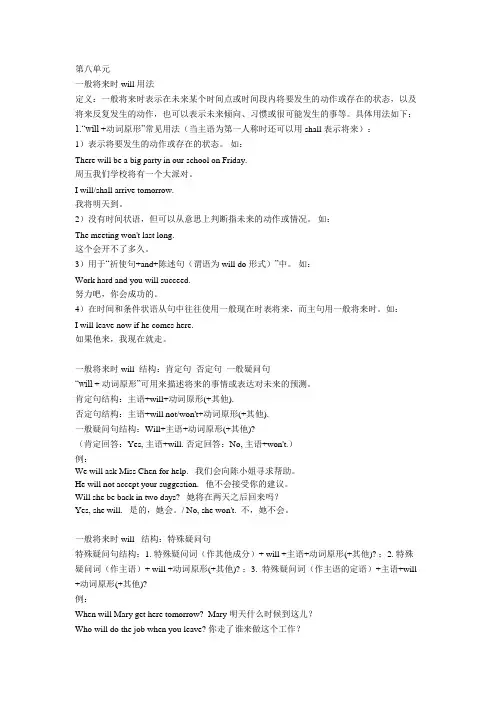
第八单元一般将来时will 用法定义:一般将来时表示在未来某个时间点或时间段内将要发生的动作或存在的状态,以及将来反复发生的动作,也可以表示未来倾向、习惯或很可能发生的事等。
具体用法如下:1.“will +动词原形”常见用法(当主语为第一人称时还可以用shall表示将来):1)表示将要发生的动作或存在的状态。
如:There will be a big party in our school on Friday.周五我们学校将有一个大派对。
I will/shall arrive tomorrow.我将明天到。
2)没有时间状语,但可以从意思上判断指未来的动作或情况。
如:The meeting won't last long.这个会开不了多久。
3)用于“祈使句+and+陈述句(谓语为will do形式)”中。
如:Work hard and you will succeed.努力吧,你会成功的。
4)在时间和条件状语从句中往往使用一般现在时表将来,而主句用一般将来时。
如:I will leave now if he comes here.如果他来,我现在就走。
一般将来时will 结构:肯定句否定句一般疑问句“will + 动词原形”可用来描述将来的事情或表达对未来的预测。
肯定句结构:主语+will+动词原形(+其他).否定句结构:主语+will not/won't+动词原形(+其他).一般疑问句结构:Will+主语+动词原形(+其他)?(肯定回答:Yes, 主语+will. 否定回答:No, 主语+won't.)例:We will ask Miss Chen for help. 我们会向陈小姐寻求帮助。
He will not accept your suggestion. 他不会接受你的建议。
Will she be back in two days? 她将在两天之后回来吗?Yes, she will. 是的,她会。
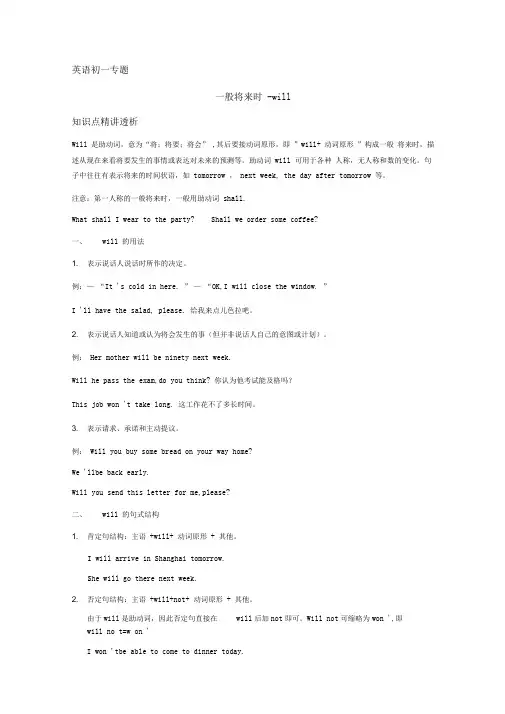
英语初一专题一般将来时 -will知识点精讲透析Will 是助动词,意为“将;将要;将会” ,其后要接动词原形,即”will+ 动词原形”构成一般将来时,描述从现在来看将要发生的事情或表达对未来的预测等。
助动词will 可用于各种人称,无人称和数的变化。
句子中往往有表示将来的时间状语,如tomorrow ,next week, the day after tomorrow 等。
注意:第一人称的一般将来时,一般用助动词shall.What shall I wear to the party? Shall we order some coffee?一、will 的用法1. 表示说话人说话时所作的决定。
例:—“It 's cold in here. ”—“OK,I will close the window. ”I 'll have the salad, please. 给我来点儿色拉吧。
2. 表示说话人知道或认为将会发生的事(但并非说话人自己的意图或计划)。
例:Her mother will be ninety next week.Will he pass the exam,do you think? 你认为他考试能及格吗?This job won 't take long. 这工作花不了多长时间。
3. 表示请求、承诺和主动提议。
例:Will you buy some bread on your way home?We 'llbe back early.Will you send this letter for me,please?二、will 的句式结构1. 肯定句结构:主语+will+ 动词原形+ 其他。
I will arrive in Shanghai tomorrow.She will go there next week.2. 否定句结构:主语+will+not+ 动词原形+ 其他。
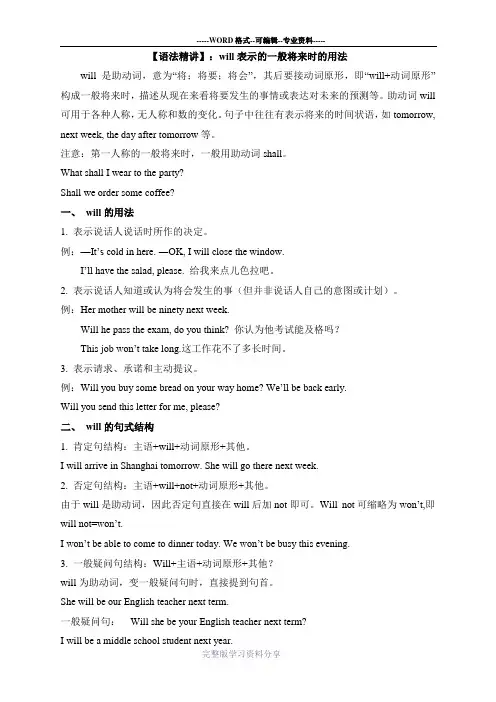
【语法精讲】:will表示的一般将来时的用法will是助动词,意为“将;将要;将会”,其后要接动词原形,即“will+动词原形”构成一般将来时,描述从现在来看将要发生的事情或表达对未来的预测等。
助动词will 可用于各种人称,无人称和数的变化。
句子中往往有表示将来的时间状语,如tomorrow, next week, the day after tomorrow等。
注意:第一人称的一般将来时,一般用助动词shall。
What shall I wear to the party?Shall we order some coffee?一、will的用法1. 表示说话人说话时所作的决定。
例:—It’s cold in here. ―OK, I will close the window.I’ll have the salad, please. 给我来点儿色拉吧。
2. 表示说话人知道或认为将会发生的事(但并非说话人自己的意图或计划)。
例:Her mother will be ninety next week.Will he pass the exam, do you think? 你认为他考试能及格吗?This job won’t take long.这工作花不了多长时间。
3. 表示请求、承诺和主动提议。
例:Will you buy some bread on your way home? We’ll be back early.Will you send this letter for me, please?二、will的句式结构1. 肯定句结构:主语+will+动词原形+其他。
I will arrive in Shanghai tomorrow. She will go there next week.2. 否定句结构:主语+will+not+动词原形+其他。
由于will是助动词,因此否定句直接在will后加not即可。
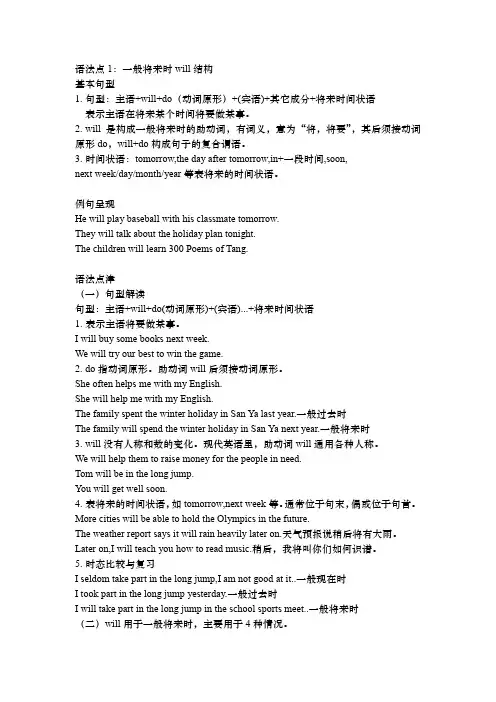
语法点1:一般将来时will结构基本句型1.句型:主语+will+do(动词原形)+(宾语)+其它成分+将来时间状语表示主语在将来某个时间将要做某事。
2.will是构成一般将来时的助动词,有词义,意为“将,将要”,其后须接动词原形do,will+do构成句子的复合谓语。
3.时间状语:tomorrow,the day after tomorrow,in+一段时间,soon,next week/day/month/year等表将来的时间状语。
例句呈现He will play baseball with his classmate tomorrow.They will talk about the holiday plan tonight.The children will learn 300 Poems of Tang.语法点津(一)句型解读句型:主语+will+do(动词原形)+(宾语)...+将来时间状语1.表示主语将要做某事。
I will buy some books next week.We will try our best to win the game.2.do指动词原形。
助动词will后须接动词原形。
She often helps me with my English.She will help me with my English.The family spent the winter holiday in San Ya last year.一般过去时The family will spend the winter holiday in San Ya next year.一般将来时3.will没有人称和数的变化。
现代英语里,助动词will通用各种人称。
We will help them to raise money for the people in need.Tom will be in the long jump.You will get well soon.4.表将来的时间状语,如tomorrow,next week等。
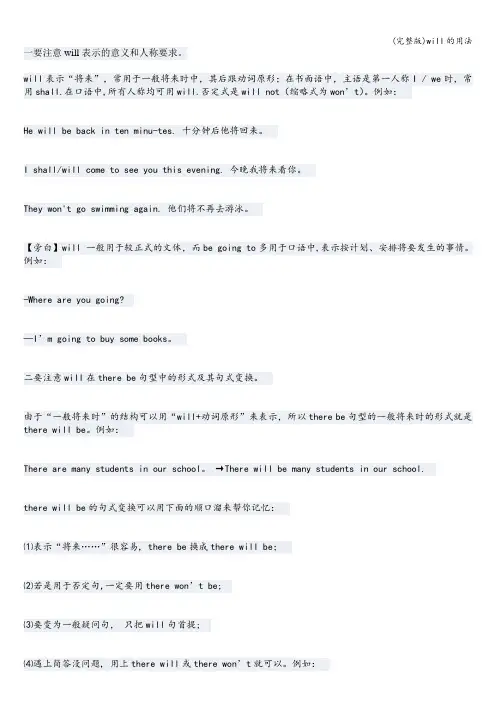
一要注意will表示的意义和人称要求。
will表示“将来”,常用于一般将来时中,其后跟动词原形;在书面语中,主语是第一人称I / we时,常用shall.在口语中,所有人称均可用will.否定式是will not(缩略式为won’t)。
例如:He will be back in ten minu-tes. 十分钟后他将回来。
I shall/will come to see you this evening. 今晚我将来看你。
They won't go swimming again. 他们将不再去游泳。
【旁白】will 一般用于较正式的文体,而be going to多用于口语中,表示按计划、安排将要发生的事情。
例如:-Where are you going?—I’m going to buy some books。
二要注意will在there be句型中的形式及其句式变换。
由于“一般将来时”的结构可以用“will+动词原形”来表示,所以there be句型的一般将来时的形式就是there will be。
例如:There are many students in our school。
→There will be many students in our school.there will be的句式变换可以用下面的顺口溜来帮你记忆:⑴表示“将来……”很容易, there be换成there will be;⑵若是用于否定句,一定要用there won’t be;⑶要变为一般疑问句,只把will句首提;⑷遇上简答没问题, 用上there will或there won’t就可以。
例如:⑴There is some pollution in our hometown. →There will be some pollution in our hometown.⑵ There will be more cars in ten years。
一般将来时的用法一般将来时(Simple Future Tense)是描述将来发生的事情或计划的一种时态。
在英语中,一般将来时的构成方式比较简单,一般使用助动词“will”或“be going to”来表示将来时态。
除了这两种方式外,还有其他一些用法和注意事项。
本文将详细介绍一般将来时的用法。
一、will的用法1. 表示意愿或决定:我们可以使用will表示即时决定或表示意愿。
例如:- I am thirsty. I will get some water.(我口渴了。
我要去倒些水。
)- He doesn't have a car, so I will lend him mine.(他没有车,所以我会借给他我的车。
)2. 表示预测或推测:will可用来表达对未来情况的推测或预测。
例如:- It's getting cloudy. I think it will rain soon.(天开始多云了。
我觉得很快就会下雨。
)- She is such a talented musician. I'm sure she will become famous one day.(她是一个非常有才华的音乐家。
我相信她总有一天会出名的。
)3. 提供承诺或请求:will也可以用来表示承诺或请求。
例如:- I will definitely help you with your project.(我一定会帮你完成你的项目。
)- Will you please pass me the salt?(请你把盐递给我好吗?)二、be going to的用法1. 表示计划或打算:be going to可以用来表示我们已经有了计划或打算要做某事。
例如:- I am going to visit my parents this weekend.(我打算这个周末去看望我的父母。
)- They are going to open a new restaurant in town.(他们打算在城里开一家新餐厅。
⼀般将来时will⼀般将来时will⼀、最基本的结构:will + 动词原形例句1:I/We/You/He/She/They will visit the museum tomorrow.明天我/我们/你/他/她/他们要去参观博物馆。
归纳1:⼀般将来时表⽰将来发⽣的动作或存在的状态,其构成形式为;其中will为助动词,(有/没有)⼈称和单复数的变化,可缩写为__________.例句2: They won’t visit the museum tomorrow.归纳2: 变否定句,在助动词will后加,缩写为例句3: ---Will they visit the museum tomorrow?---Yes, they will./ No, they won’t.归纳3:变⼀般疑问句,将提到主语前。
回答:肯定________ 否定_________.例句4:My father will work in Beijing next year.(划线部分提问)What _______your father _______next year?⼆、划出以下句⼦中与⼀般将来时连⽤的时间状语并写出其意思。
1. We will have a picnic tomorrow.( )2. He will come back the day after tomorrow. ( )3. You will see your daughter soon. ( )4. They will get to Beijing in three days. ( )5. What will happen in the future? ( )6. She will go to Dalian next week. ( )7. My dream will come true some day. ( )三、will主要⽤于在以下⼏个⽅⾯:1、表⽰单纯的未来“将要”通⽤各个⼈称。
will用法归纳关键信息项:1、 will 表示将来时态示例:____________________________解释:____________________________ 2、 will 用于表达意愿示例:____________________________解释:____________________________ 3、 will 用于表示推测示例:____________________________解释:____________________________ 4、 will 用于提出请求或邀请示例:____________________________解释:____________________________ 5、 will 用于表示习惯或倾向示例:____________________________解释:____________________________11 will 表示将来时态111 一般将来时的构成:will +动词原形,用于表示将来某个时间要发生的动作或存在的状态。
例如:I will go to Beijing next week (我下周将去北京。
)112 与时间状语连用:常见的时间状语有 tomorrow, next year, in the future 等。
例如:He will come back tomorrow (他明天会回来。
)又如:They will have a party next month (他们下个月将举办一个聚会。
)113 疑问句和否定句的构成:疑问句将 will 提到主语前,否定句在will 后加 not,缩写为 won't。
例如:Will you go shopping with me? (你会和我一起去购物吗?)又如:She won't be late (她不会迟到。
)12 will 用于表达意愿121 表示主语的意愿、决心或承诺。
一般将来时will
一般将来时(will)是英语中表示将来发生的动作或状态的一种时态。
它通常用于以下几种情况:预测未来的事情、表达意愿或决定、表示承诺或允诺、提供帮助或建议等。
一般将来时可以用于预测未来的事情。
比如,我们可以预测未来的天气情况。
明天会下雨吗?我们可以说:“明天会下雨。
”又如,我们可以预测未来的科技发展。
未来我们会有更先进的科技设备,如智能手机、无人驾驶汽车等。
一般将来时可以用于表达意愿或决定。
比如,如果有人问你是否参加明天的聚会,你可以回答:“我会参加。
”又如,如果你决定在下个月开始学习一门新的语言,你可以说:“我将开始学习一门新的语言。
”
一般将来时还可以用于表示承诺或允诺。
比如,如果你答应帮助朋友写一篇英语作文,你可以说:“我会帮你写。
”又如,如果你答应朋友明天一起去购物,你可以说:“我会和你一起去。
”
一般将来时还可以用于提供帮助或建议。
比如,如果有人问你如何学好英语,你可以给出建议:“你可以每天多听英语歌曲,多看英语电影。
”又如,如果有人问你需要帮助时应该怎么办,你可以回答:“你可以向老师寻求帮助,或者找朋友讨论。
”
一般将来时(will)在英语中用于表示将来发生的动作或状态。
它可以用于预测未来的事情、表达意愿或决定、表示承诺或允诺、提供帮助或建议等。
在运用一般将来时时,我们需要注意语句的结构和语法规则,使用恰当的动词形式和词汇,以确保表达准确清晰。
通过学习和掌握一般将来时的用法,我们可以更好地理解和运用英语,在日常生活和学习中得心应手。
will的用法归纳
1.作一般将来时的助动词。
例句略。
2.作情态动词。
(1)表示意愿。
She won’t let us know her trouble.她不愿意让我们知道她的困难。
(2)表示“习惯性(总是)、倾向性、可能性”等。
Man will die.人固有一死。
Children will be children.孩子毕竟是孩子。
(3)表示命令、许诺、叮嘱等。
You will have your share.你会得到你那一份的。
(4)表示请求、礼节性的邀请或询问对方的意愿,只用于第二人称疑问句。
Will you please be quiet?安静点,好吗?
Will you accept the invitation/offer?你接受邀请/offer吗?
3.作实义动词,表示“决心要,愿意”。
短语:be willing to do sth愿意做某事
The boss is willing to offer help.老板愿意提供帮助。
4.作名词,表示“意愿,意志力”。
He has a strong will for the knowledge.他有强烈的求知欲。
She is a girl with a strong will.她是一个有坚强意志力的女生。
His words are against his will.他的话是违心的。
Where there is a will there is a way.心想事成。
will巨型举例
will的句型有:
1、“will+动词原型”表示一般将来时。
2、肯定句:主语+will+动词原型+(宾语)+其他。
3、否定句:在will的后面加not即可。
4、一般疑问句:把will提到句子主语之前,结尾变问号。
5、特殊疑问句:特殊疑问句+will+主语+动词原形+其他。
will的用法:
1、will用作助动词时主要用于构成将来式,在美式英语中各个人称均可用will构成将来式,而在英式英语中则多用于第二、第三人称。
在英式英语中当主语是“第二〔第三〕人称+I〔we〕”时也多使用will。
2、will还可用作情态动词:用于第一人称时表示说话人(即主语)的意志,含有“愿意”“许诺”“意向”或“决定”等意义。
3、will用作动词的基本意思是“用意志力驱使(某事发生)”,可接名词、代词作宾语,也可接以动词不定式充当补足语的复合宾语。
4、will作“将(财产)遗赠某人”解时,可接that引导的从句作宾语,从句的谓语动词要用虚拟式,也可接双宾语,其间接宾语可转化成介词to的宾语。
5、will作“愿意,希望,想要”解时,可接名词、代词作宾语,也可接that引导的从句作宾语,从句中的谓语动词要用虚拟式。